Corpus Christi Blog
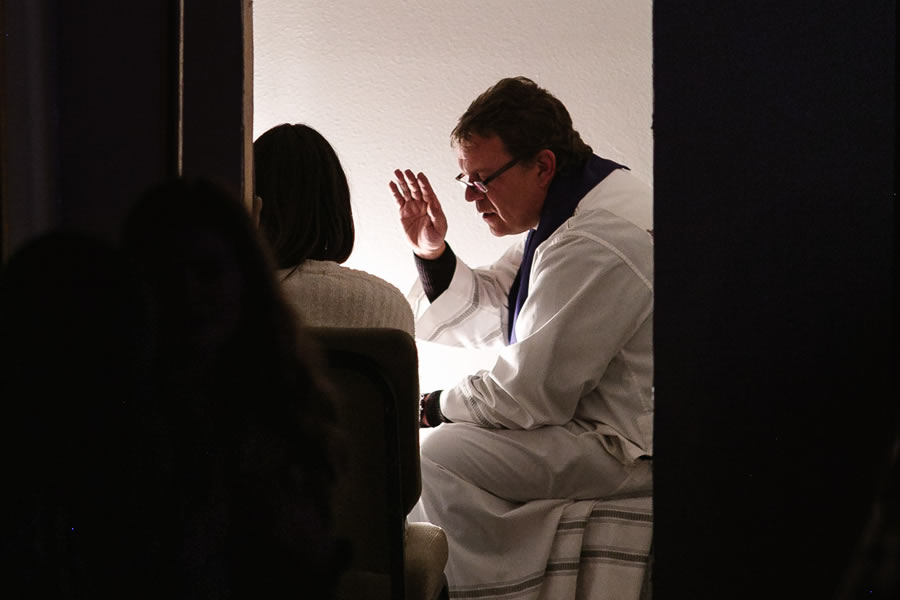
Reconciliation
01-31-2021Weekly ReflectionJen Arnold, M.A. in Theology and CatecheticsIn our continued study of the seven sacraments, the next two fall under the category of the sacraments of healing. Although we are full members of the Church through the sacraments of initiation, we need to be continually healed by the Divine Physician throughout our journey to heaven. Despite being members of the body of Christ, “we are still in our ‘earthly tent,’ subject to suffering, illness, and death. This new life as a child of God can be weakened and even lost by sin” (CCC #1420). Therefore, we have the sacraments of Penance & Reconciliation and Anointing of the Sick to provide us spiritual healing from our human condition.
READ MORE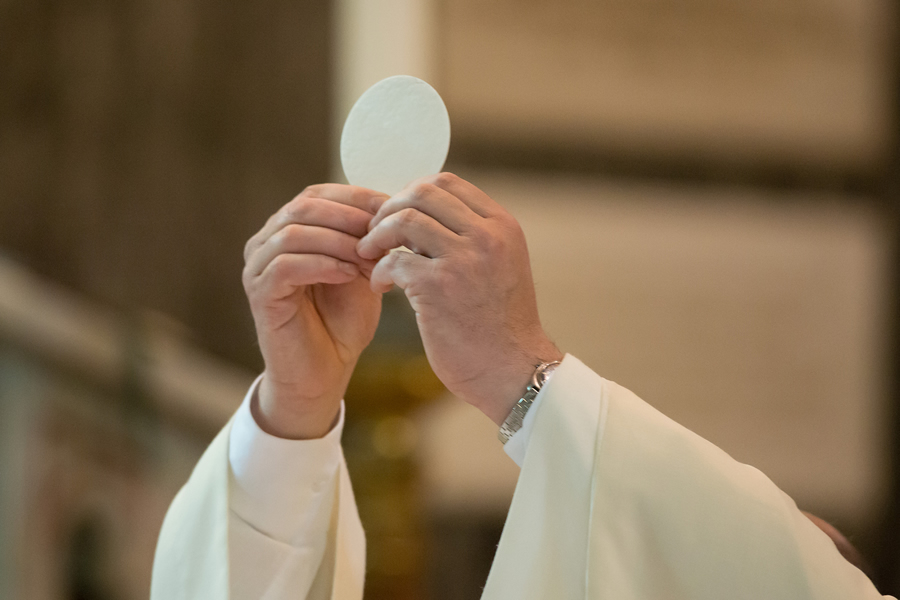
The Eucharist
01-24-2021Weekly ReflectionJen Arnold, M.A. in Theology and CatecheticsThe Eucharist is the next Sacrament we will explore as we continue our journey through the seven sacraments of the Catholic Church. It is the third and final sacrament of initiation and the completion of our unification to the family of God and the Mystical Body of Christ.
The Catechism quotes Lumen Gentium (the Dogmatic Constitution of the Church from the Second Vatican Council) saying, the Eucharist is “the source and summit of the Christian life” (CCC #1324). This simple statement is packed with physical and spiritual realities. The Eucharist, or Communion, binds Catholics on earth with one another as we partake in the same Body and Blood of Christ all over the Earth. It unites us to Jesus Christ in His one sacrifice on Calvary. It joins us to the ongoing liturgy that takes place in heaven as all who have gone before us worship at the same heavenly altar. Furthermore, it is the continual font by which God bestows sanctifying grace upon us each time we partake – the nourishment we need to sustain our spiritual life. Imagine the Eucharist at the center of a cross and see it as the central point at which all of the horizontal and vertical relationships in the mystical Body of Christ come together (CCC #1324-1327).
READ MORE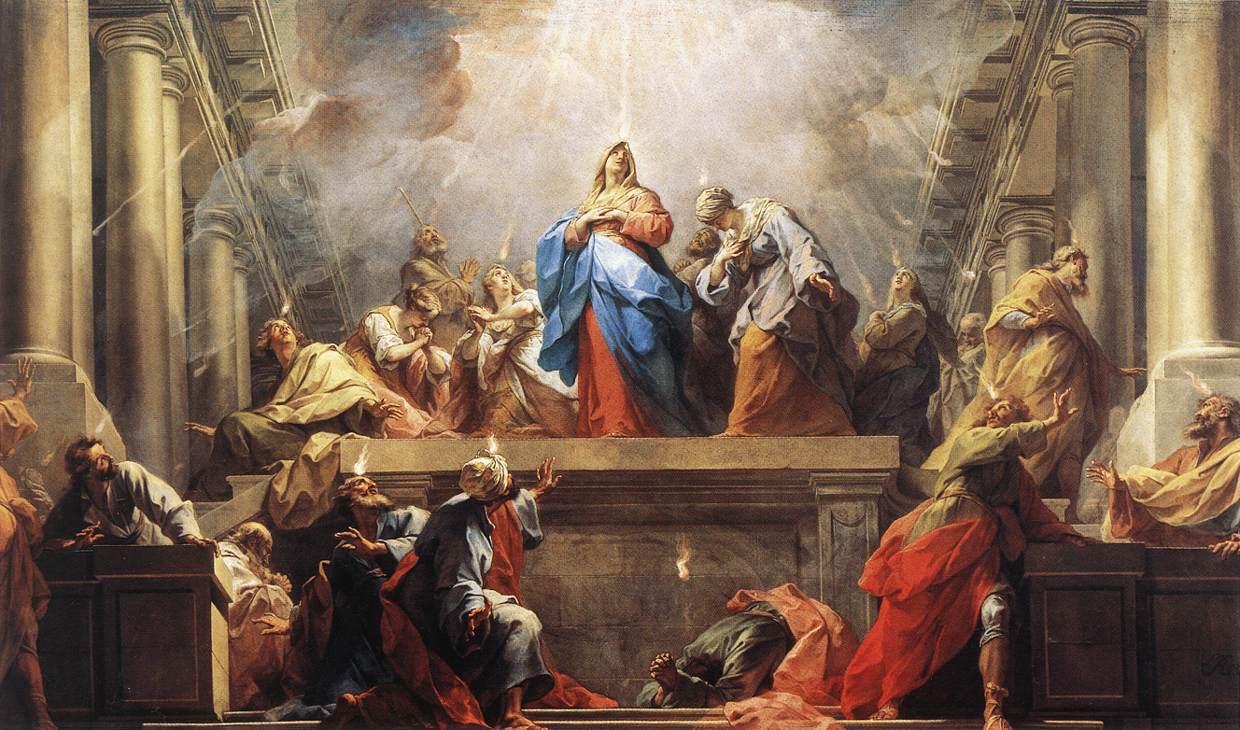
Confirmation
01-17-2021Weekly ReflectionJen Arnold, M.A. in Theology and CatecheticsThis week, as we continue our examination of the seven Sacraments, we will take a closer look at the Sacrament of Confirmation.
The Catechism places Confirmation after Baptism because this Sacrament is the completion of the graces received at Baptism. “For ‘by the sacrament of Confirmation, [the baptized] are more perfectly bound to the Church and are enriched with a special strength of the Holy Spirit. Hence they are, as true witnesses of Christ, more strictly obliged to spread and defend the faith by word and deed’” (CCC #1285). So, the graces received at baptism are fortified by the graces received in Confirmation in order to strengthen the faithful in their call to evangelize and defend the Faith.
Confirmation was instituted by Christ Himself and uses physical means to communicate heavenly realities, which, if you recall from last week, are the two defining components of a sacrament. Jesus promised an outpouring of the Holy Spirit many times to His disciples. These promises came to their fulfillment on Pentecost. The Holy Spirit descended upon the upper room and empowered the Apostles to go out and proclaim to the thousands gathered “the mighty works of God” in their own languages. Then those who were converted also received the gifts of the Holy Spirit (CCC #1286). Further, there are three New Testament scriptural references (Acts 8:15-17, Acts 19:5-6, Hebrews 6:2) in which the Apostles apply the laying on of hands – imparting the gifts of the Spirit – after Baptism. This illustrates that the teaching they received from Jesus was to confer the Sacrament of Confirmation following Baptism, in order to complete and fulfill the baptismal graces (CCC #1288). The Sacraments of Baptism and Confirmation, thereby, go hand in hand.
READ MORE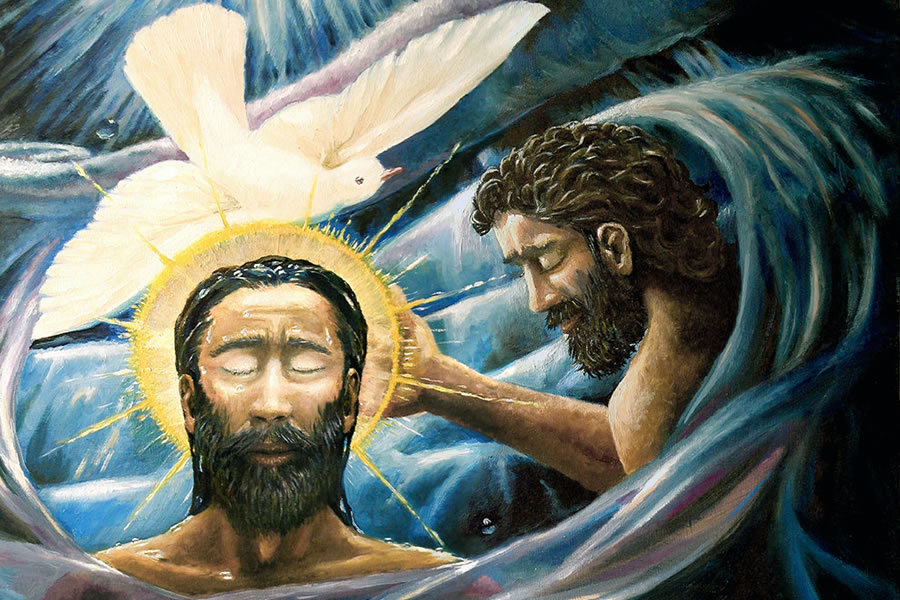
Baptism
01-10-2021Weekly ReflectionJen Arnold, M.A. in Theology and CatecheticsToday we celebrate the Baptism of our Lord, Jesus Christ. I will take this opportunity to begin a six-part series on the seven sacraments of the Catholic Church, beginning with Baptism and combining Marriage and Holy Orders later.
Let’s begin with the technical definition of a sacrament found in the glossary of the Catechism of the Catholic Church: “an efficacious sign of grace, instituted by Christ and entrusted to the Church, by which divine life is dispensed to us through the work of the Holy Spirit.” Another way of understanding the sacraments is to think of them as methods by which Jesus gifted us an opportunity to participate in the divine life through material and earthly things, and by which we receive actual graces according to the particular sacrament. Because we are physical and spiritual beings, God communicates heavenly realities to us by way of visible creation. “As a being at once body and spirit, man expresses and perceives spiritual realities through physical signs and symbols. As a social being, man needs signs and symbols to communicate with others, through language, gestures, and actions. The same holds true for his relationship with God” (CCC #1146). In simple terms, God comes down to our level in the sacraments and speaks to us in our own human means of communication.
READ MORE
The Epiphany
01-03-2021Weekly ReflectionJen Arnold, M.A. in Theology and CatecheticsToday we celebrate the feast of the Epiphany, which is the day the Magi finally arrived to worship the child, Jesus. During Advent we discussed the Magi and their importance as a representation of Jesus coming to save the entire world and not just a select few. This week, I would like to focus on the actual journey the Magi embarked upon to find Him and how we all imitate that journey as we continually seek out Jesus in our own lives.
The first point to make is that, in order to set out on a journey toward Jesus, we have to make a choice. The Magi first engaged their intellects to examine the evidence available to them, particularly the Nativity Star, and then engaged their wills to set out to see where that evidence would lead them. While it is possible to set out on some journeys with no rhyme nor reason other than seeing where the wind takes you, it cannot be so on a journey to Jesus. The Magi had a goal – an end – and they made a decision to set out and reach that end. We are called to emulate the Magi in this sense. We are called to see the things around us that point us to Jesus, evaluate them, and make a conscious decision to use those things to lead us on a journey with a concrete, ultimate end: heaven.
Now, just because the Magi had an end point to their journey, it does not mean that they had a direct, straight, and uninhibited path to the end. If it was easy and direct, it might be considered a stroll. However, the word journey tends to evoke images of hills, valleys, road construction, detours, losing one’s way, faulty GPS, running out of snacks, and vehicle trouble. Of course, the Magi did not have to suffer through many of the modern inconveniences I mentioned, but they certainly had their fair share of difficulty, as something is always bound to go awry if one travels for any significant length of distance to reach an end. To embark upon a journey implies taking on some risks. Psalm 121 is often referred to as the traveler’s psalm and calls to mind some of this risk, but also reminds us from where our strength comes as we endure what lies between us and our goal. Psalm 121 begins, “I lift my eyes to the hills. From where does my help come? My help comes from the Lord, who made heaven and earth.” Right away, the speaker sees the obstacles right in front of him, the hills, but keeps his eyes on the top, the goal. He does not look at the certain arduousness of the coming journey, beginning at the base of the hills. Rather, he affixes his gaze upon the goal and recognizes from where his strength and help will come, which is God.
READ MORE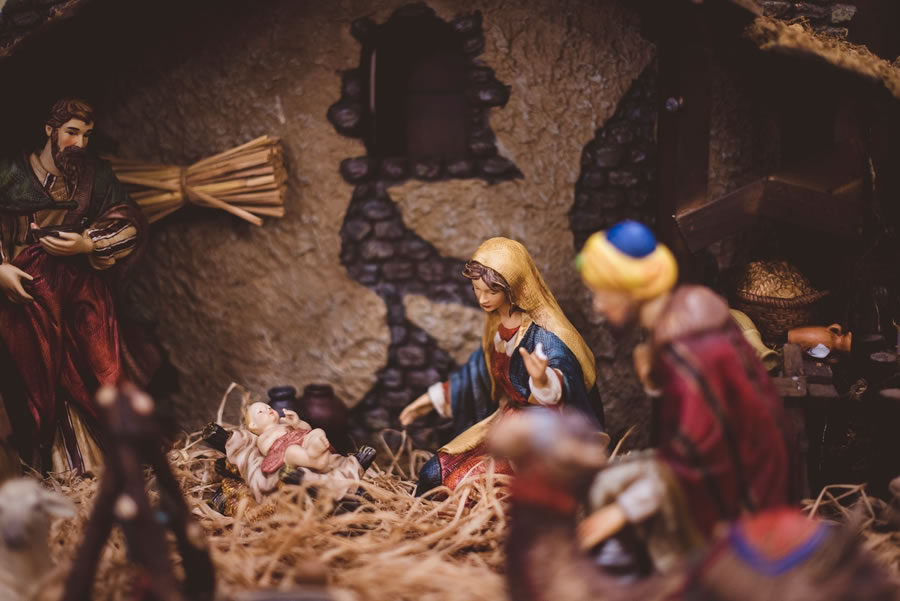
How can we be like the Holy Family?
12-27-2020Weekly ReflectionJen Arnold, M.A. in Theology and CatecheticsToday, as we celebrate the feast of the Holy Family, we will take a look at the gift God has given us in our own families and how they are reflections of God’s love and inner life.
In 2018, our very own Bishop Olmsted wrote a letter to his flock called, Complete my Joy: An Apostolic Exhortation to the Husbands and Wives, Mothers and Fathers of the Diocese of Phoenix. He wanted to highlight the unique role the family unit has in God’s redemptive plan and to offer us encouragement in our family vacations. Due to the nature of family life, which is rooted in love and communal life, he posited that “Family is likely where we will feel the deepest joys as well as the deepest pain.” (#2). Whatever ups and downs we experience in our family life, they can all be used for our ultimate good and contribute to our own personal healing and the mission of our family in the world overall.
The first point to make is that families are a reflection of the Divine Trinity. God is three persons in one God-Father, Son, and Holy Spirit. This a communal union that exists only in perfect love as the three persons give and receive continual love between one another. Humans were made in the image and likeness of God and were therefore created for love. We are meant to love and be loved and our love produces fruit, both in the procreative act of bringing about children and by the light our love puts out into the world as it reveals God’s love. “As the concrete image of God to the world, every family – your family – is, by its nature, a communion of love and life.” (#10).
READ MORE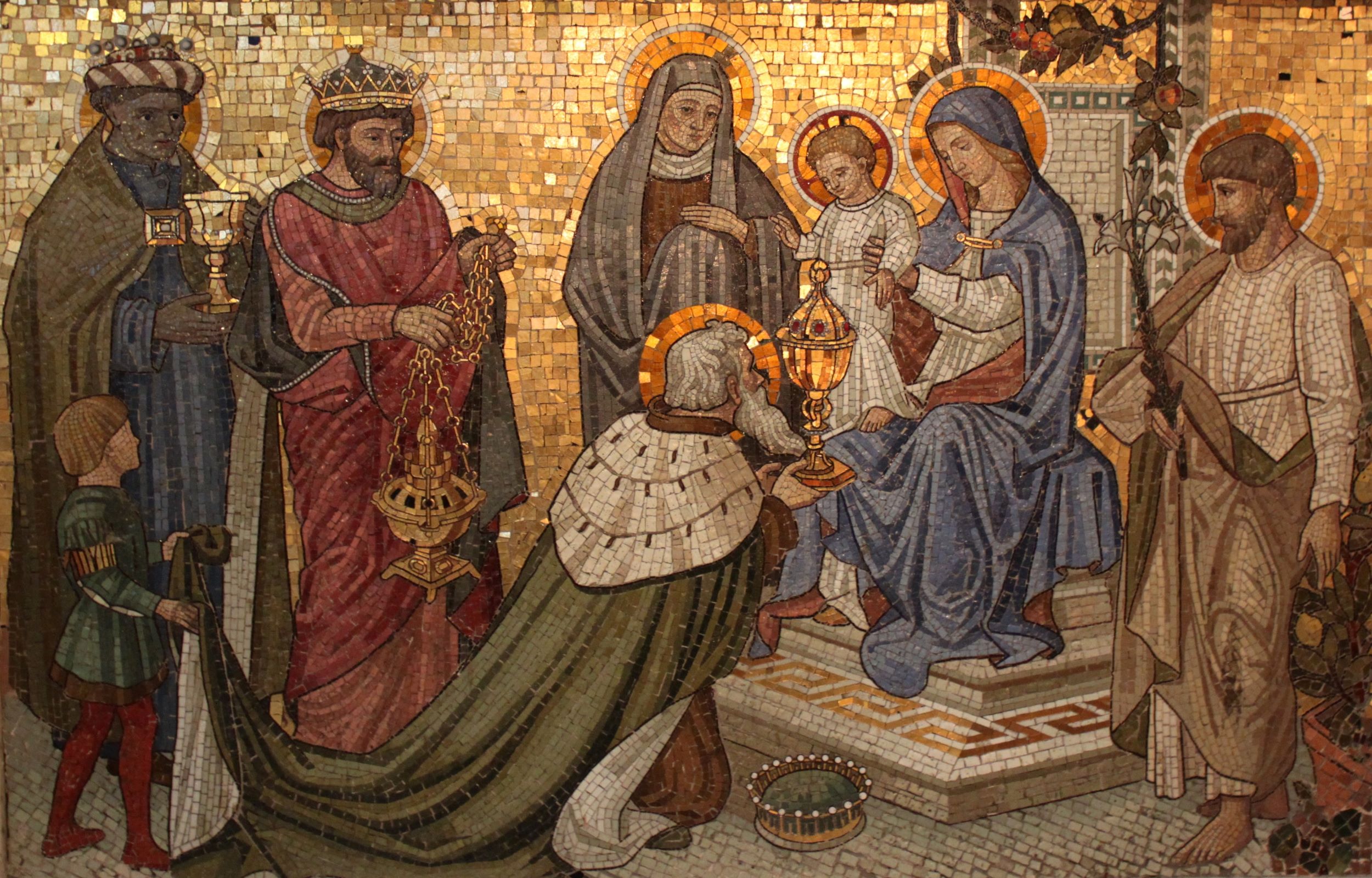
O, Come Let Us Adore Him (Part 4 of 4)
12-19-2020Weekly ReflectionJen Arnold, M.A. in Theology and CatecheticsAs we enter the fourth week of Advent, we will look at the final group of people called to adore the infant Christ, the magi. There is a lot of mystery surrounding the magi. Who they were, where they came from, and what their belief system was, is not explicitly explained in Scripture or taught by the Magisterium. In the Acts of the Apostles, there is a reference to a magus (the Latin singular of magi) named, Simon, who was a practitioner of magic. However, this could apply to many cultures and philosophical belief systems. There isn’t even a clear indication of how many there were, but early Church fathers say three, which is likely influenced by the three gifts Jesus received – gold, frankincense, and myrrh. Tradition gives them the names Gaspar, Melchior, and Balthasar.
Despite all the mystery surrounding the magi, we don’t need any more information about them than what we have, to understand who and what they represent in the context of coming to adore Jesus as the Savior of the World. Matthew tells us they were “wise” and when they saw the star announcing His birth, they followed it to go and worship Him (Mt. 2:1-2). In Jesus of Nazareth: The Infancy Narratives, Pope Benedict XVI tells us what it means to be a wise man who sets out to find Jesus. To be wise is to seek TRUTH – truth in philosophy, truth in science, and truth in religion. It is to step out of your own narrow perspective of truth as you have defined or accepted it and to seek truth as it actually is. To be wise is to seek the fullness of truth and understanding. Benedict also states that the magi would not have set out to seek Jesus had they not been a “people of inner unrest, people of hope, people on the lookout for the true star of salvation.” In other words, had they been satisfied with their own idea of truth and spiritual practices, they would have had no inner pull or desire to seek out the Newborn King. Think of all the people in your life who always seem to be seeking more. The Catechism affirms this, telling us, “The desire of God is written in the human heart because man is created by God and for God, and God never ceases to draw man to himself. Only in God will he find the truth and happiness he never stops searching for.” (CCC #27). In other words, the soul is wired to seek out the truth and will never truly rest until it rests in God. The magi were wise, in that they were willing to humble themselves to receive and adore the real truth, as opposed to continuing to seek it in things that contained but a sliver of truth.
READ MORE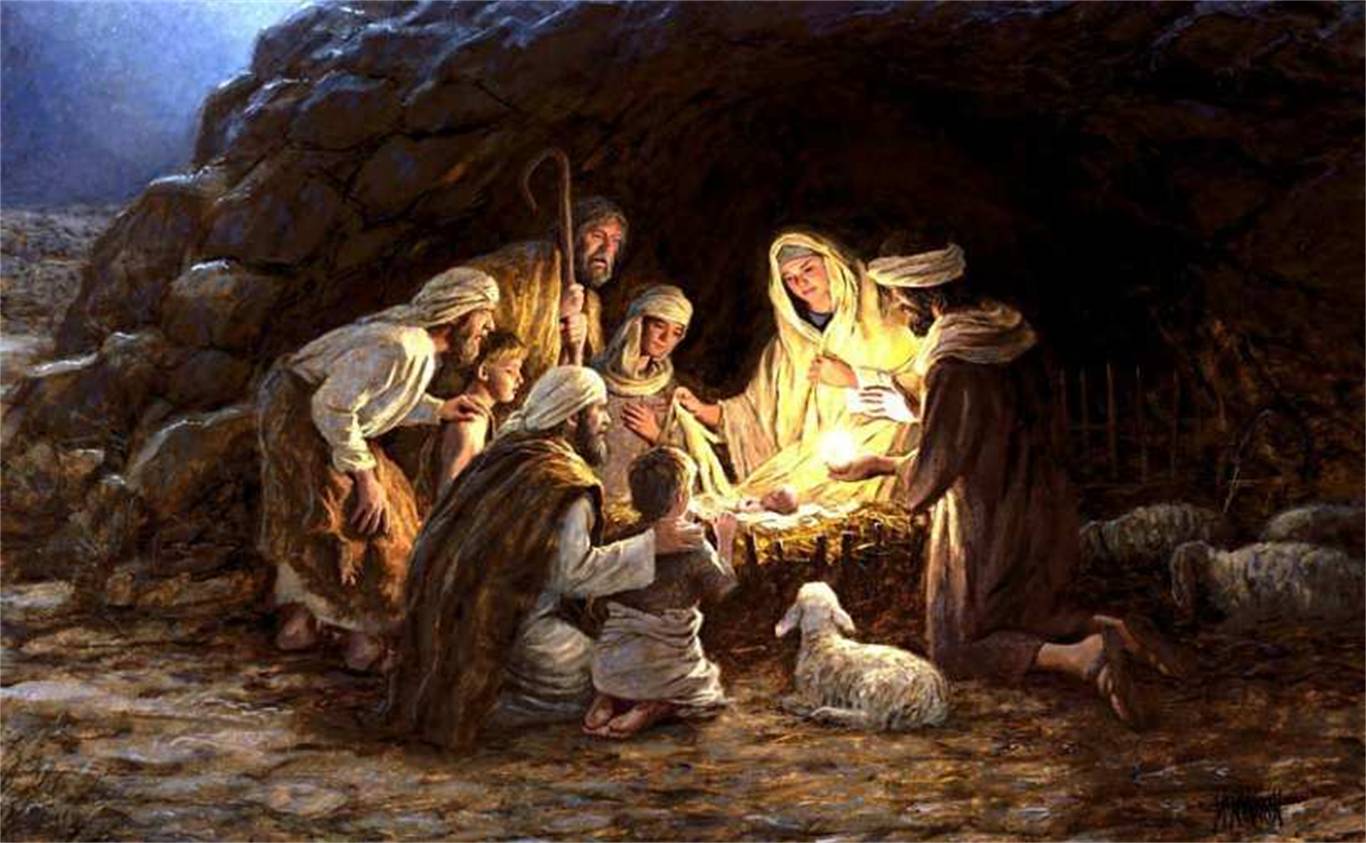
O, Come Let Us Adore Him (Part 3 of 4)
12-13-2020Weekly ReflectionJen Arnold, M.A. in Theology and CatecheticsThis week we will look at the third group that was invited to come adore the infant Jesus in the flesh – the shepherds. The angels, who had already existed in a state of perpetual adoration of God, rushed out to joyfully proclaim the birth of Jesus to the shepherds in the fields. I find that the shepherds are the most easily relatable characters in the nativity story, in terms of their coming to adore Jesus. Sometimes it can be more difficult to identify with Mary, Joseph, and the angels because they were all fittingly endowed with spiritual gifts that the rest of us simply are not. However, the shepherds, the simple workers in the field, are more representative of us ordinary human beings.
READ MORE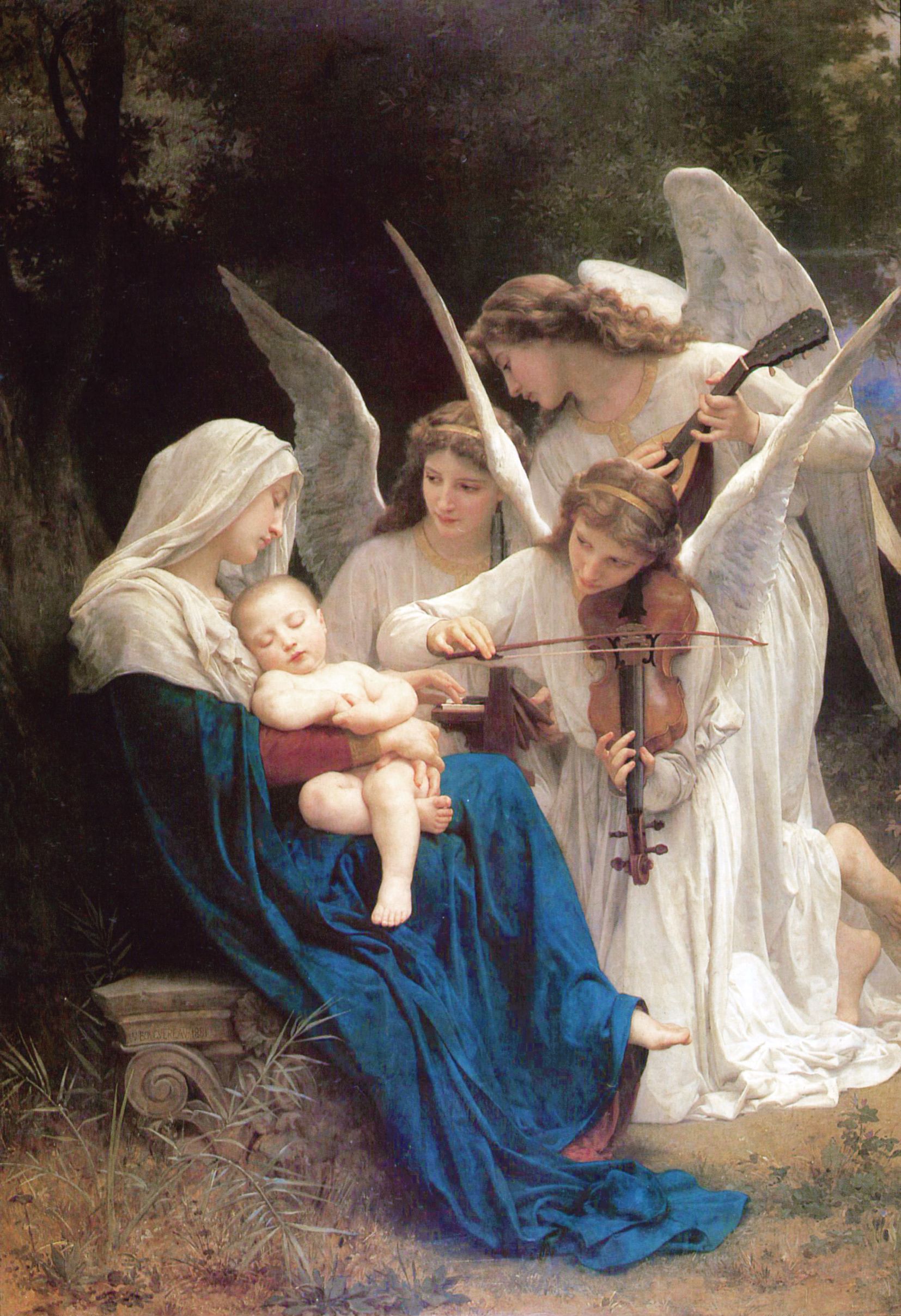
O, Come Let Us Adore Him (Part 2 of 4)
12-06-2020Weekly ReflectionJen Arnold, M.A. in Theology and CatecheticsLast week, we reflected on what it meant for Jesus’ parents to adore Him, not only as their Son, but also as their Lord, and how we are invited into that intimate familial love and adoration of Jesus. This week we’ll look at what it means to adore Jesus from the perspective of another group of beings, the angels. Earlier this year I wrote a piece about the nine choirs of angels and their various roles in the adoration of God and their service in growing His kingdom. If you missed that catechesis and would like an in-depth look at angels, you can find it on our parish website blog, dated June 28, 2020. For this reflection, however, it is enough to know that angels have deep knowledge and understanding of who God is, and as a result, remain in constant adoration of God.
Our guardian angels have been working our entire lives to helping guide us toward God and away from the temptation of sin – whether we listen or not! Imagine their rejoicing when the time came for the Savior of the World to be born in human flesh as the antidote to our ongoing corruption. For all of the time, they have had direct knowledge of the goodness of God, and now, we too could have a heightened and more advanced knowledge of that goodness as well. The honor given to St. Gabriel the Archangel to announce to Mary that she would conceive and bear God’s Son must have been a completely humbling experience, but more importantly, it was an act of adoration through obedience. You see, St. Gabriel adores God so deeply, that it would compel him from the very depths of his being to agree to announce the coming of Jesus to the people of the world so that they could adore Him as he does. We can imitate St. Gabriel and understand that our obedience to God’s will is an act of adoration and that by adoring Him through our words and actions, we are announcing His ever-presence in our world.
On the night of Jesus’ birth, there were also the angels who announced it to the shepherds in the field (more on the shepherds next week). Read this verse from Luke, Chapter 2, and try to imagine the scene:
READ MORE
O, Come Let Us Adore Him (Part 1 of 4)
11-26-2020Weekly ReflectionJen Arnold, M.A. in Theology and CatecheticsO, come let us adore Him…
This Advent we will spend each Sunday reflecting a bit on what it means to adore Jesus in the flesh by exploring the Nativity through the eyes of four different groups of people who all came to adore Jesus at His birth.
The first two people to have the opportunity to adore the baby Jesus were His parents, Joseph and Mary. Imagine the quiet, still night on which He was born. Having travelled to Bethlehem for the census, the Holy Family was far away from their home and all the comforts within it. There were no comfortable rooms available for them in town and they were left to welcome their newborn baby in a stable amongst animals. The Savior of the world came into the world amidst the humblest of circumstances. What Joseph, Mary, and Jesus did have was each other, bound by an unmatched familial love for one another, which would transcend any and all circumstances, no matter how challenging they might seem. Although perhaps not the most comfortable arrangements, one thing the stable did offer them was the privacy to bask in that love together, alone as a family.
READ MORE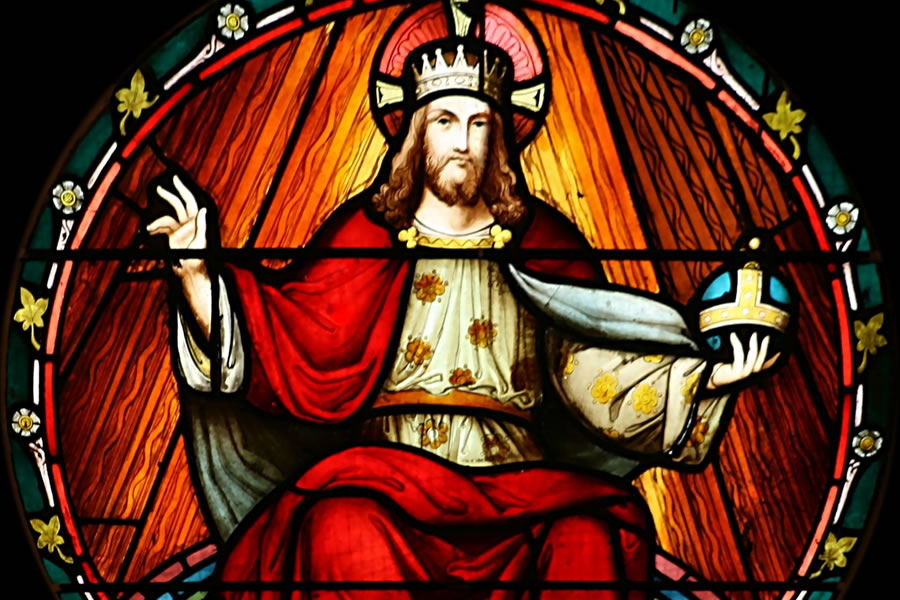
Christ the King
11-22-2020Weekly ReflectionJen Arnold, M.A. in Theology and CatecheticsThis Sunday we celebrate the Solemnity of Our Lord Jesus Christ, King of the Universe. This feast day was first established by Pope Pius XI in 1925 in response to the secularism he saw creeping into the world as more and more people began to reject having Jesus at the center of their lives. He stated that unless the Empire of the Lord was restored, there would be no peace and harmony between individuals or nations. In preparation for this week’s reflection, I read Pope Pius’ encyclical Quas Primas, in which he officially established the feast. As well as being a beautiful document, it also seems timelier today than ever before, which we will get into a little later. Before I dive into Pope Pius’ thoughts on the Kingship of Jesus, I will clear up a couple of historical details. In Quas Primas, Pope Pius proclaims the feast to take place on the last Sunday of October to precede All Saints Day. In 1969, Pope Paul VI moved the feast to the last Sunday in Ordinary Time, right before Advent, because he thought it more fitting to close out the year focusing on Christ’s dominion. Secondly, when Pope Pius originally established the feast, he called it the Feast of Christ the King. When Pope Paul changed the day of the celebration, he added “of the Universe” to emphasize the depth and breadth of the Kingdom of God. Both popes’ contributions to this feast have led to how we continue to celebrate this feast today.
READ MORE
Everything is Grace
11-15-2020Weekly ReflectionJen Arnold, M.A. in Theology and CatecheticsThere is a very simple, yet very profound and beautiful quote by St. Thérèse of Lisieux: “Everything is grace.” Everything is indeed grace and we will unpack what that means practically for us.
The Catechism of the Catholic Church defines grace like this: “Grace is favor, the free and undeserved help that God gives us to respond to his call to become children of God, adoptive sons, partakers of the divine nature and eternal life. Grace is a participation in the life of God.” (CCC #1996-1997, emphasis added.) The Catechism further differentiates between habitual grace and actual graces saying, “Habitual grace, the permanent disposition to live and act in keeping with God’s call, is distinguished from actual graces which refer to God’s interventions, whether at the beginning of conversion or in the course of the work of sanctification.” (CCC #2000, emphasis added.)
Starting at the beginning of this definition of grace, we see that the gift is free and undeserved. We currently live in a culture where people tell themselves they deserve to have anything they want, whenever they want, simply because they want it or think they have earned it in some way. So, to hear that God is giving us a free and undeserved gift might sound rather shocking to the modern ear. The truth is, that due to our sinful nature we don’t actually deserve this gift of grace that God freely offers us. The sins that we commit every single day are the same sins that nailed Jesus to His cross for our sake (another freely given and undeserved gift) which, by our human standards, is a pretty unforgivable thing to do. By offering us this undeserved gift of grace, God is demonstrating His unconditional love for us and His deep desire for us to return that love to Him.
The second part of the definition says that the gift of grace allows us to participate in the life of God, which is Trinitarian and thus includes the life of the Father, the Son, and the Holy Spirit. It means we can be yoked into the family of God and draw from that wellspring of familial love, affection, and assistance. It also means that every single human experience we could ever have can be yoked to every human experience Jesus ever had. Then, in each of these moments, we can tie in the third part of the definition; we can see how God intervenes for us and works with us and for us in everything we experience.
READ MORE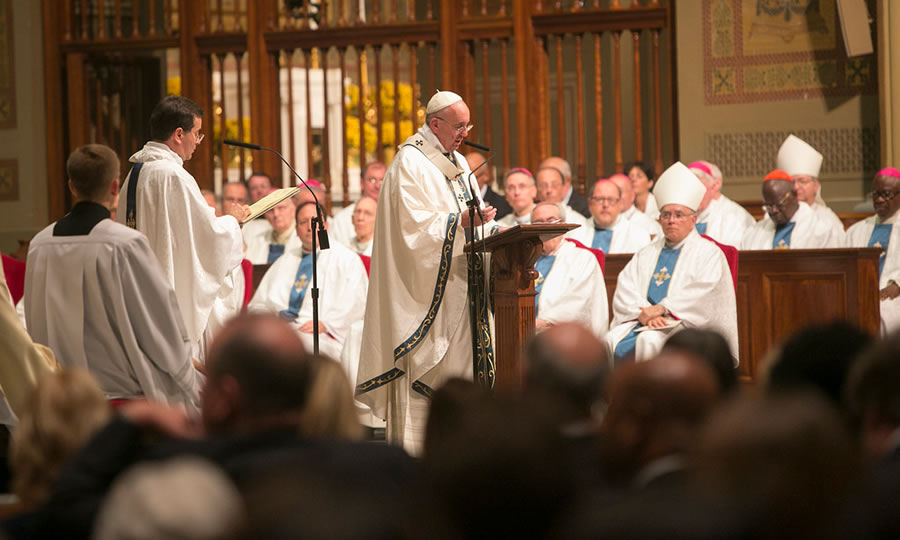
Papal Infallibility
11-08-2020Weekly ReflectionJen Arnold, M.A. in Theology and CatecheticsUnique to the Catholic Church is the role of the pope as head of the Church on earth. Thus, there are some common misunderstandings about his role and the Church’s teaching of papal infallibility. It is important to note that these misunderstandings have been around for a long time and are not just arising now. It is always worth refreshing our catechetical memories from time to time.
As we pronounce in the Creed, we say that our Church is apostolic, which means it is built on the “foundation of the Apostles,” since Christ chose them to be His first witnesses and teachers of the faith (CCC #857). The Church teaches that the twelve Apostles were the first bishops who went out and set up churches far and wide. We review the great commission:
And Jesus said to them, “All authority in heaven and on earth has been given to me. Go therefore and make disciples of all nations, baptizing them in the name of the Father and of the Son and of the Holy Spirit, teaching them to observe all that I have commanded you. And behold, I am with you always, to the end of the age.” (Matthew 28:18-20)
From Jesus’ words, we can extract certain things: 1) He is establishing them explicitly as teachers, 2) they have the power to do certain things per His authority, and 3) He will remain with the Church forever to help and guide her. We also know that later, on Pentecost, the Holy Spirit was sent as a guide and protector of the newly established Church and to empower the Apostles’ teaching office (Acts 2). Apostolic succession ensures that all bishops today can be traced back to the original Apostles.
READ MORE
Called to Holiness
11-01-2020Weekly ReflectionJen Arnold, M.A. in Theology and CatecheticsToday we celebrate the feast of All Saints and recognize and honor all the holy men and women who have come before us. Our Church gives us a gift in acknowledging the great saints who have left us their examples of how to be a follower of Jesus Christ with heroic virtue. We are not left on our own to navigate what it means to be a good disciple. Studying the saints can always inspire us to live out our Christian Faith in new ways.
As difficult as it may seem at times, we too are all called to be saints. We are all called to live a life of heroic virtue in imitation of Jesus. There is a wonderful document, called Lumen Gentium (Dogmatic Constitution of Christ), that came out of the Second Vatican Council. It outlines what the Church is and her role in the world. The chapter, “The Call to Holiness,” is dedicated to our role as laity since you and I are members of the Church. This is a universal call that applies to each one of us, regardless of our state in life. In other words, the call to holiness is not just for priests and religious, or other seemingly pious people, but to each and every one of us.
READ MORE